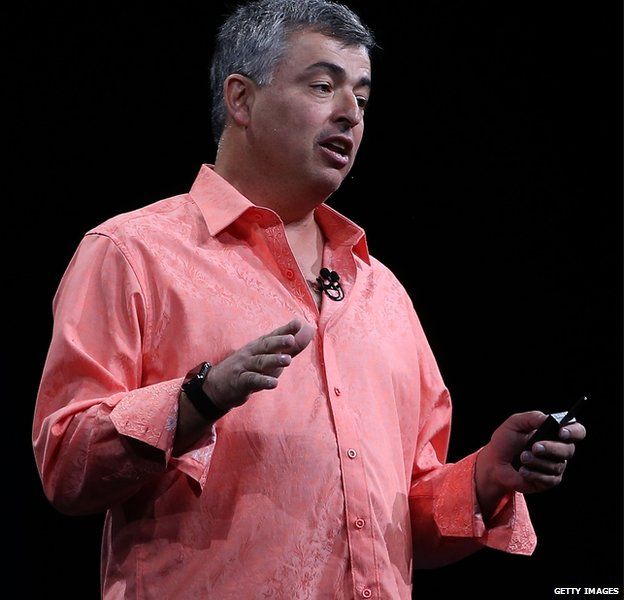Eddy Cue: Apple's dad-dancing problem-solver
- Published

Officially he's Apple's senior vice president of internet Software and services, an executive who has risen up Apple's ranks since joining the company in 1989.
But to insiders, Eddy Cue's known as the company's Mr Fix It, a man tasked with turning around the company's biggest, most-damaging slip-ups.
And more recently, he's been dubbed Apple's senior vice president of dad-dancing, thanks to an awkward, if lovable, rhythmic display at the launch event for his latest project, Apple Music.
Since that launch, the executive has faced scrutiny over how Apple plans to butt its way into the streaming music industry, currently dominated by Swedish company Spotify.
Cue's answer was a tantalising three-month trial where people will be able to try out Apple Music without having to pay the $10-a-month it'll cost thereafter.
Sounds like a nice idea, but Apple's decision to not pay out any royalties during that period has provoked the wrath of the most powerful force in music: Taylor Swift.
Now, Cue - a man known to drive a hard bargain in Apple's name - must turn problem-solver once again.
Veteran
Cue is an avid basketball fan and sports car collector who, as well as working for Apple, also sits on the board at Ferrari.
He has a reputation for being good at small talk and approachable, not a trait shared by too many of his high-ranking Apple colleagues.
In his time at the company, Cue has a track-record of making ambitious ideas work.
In a firm known primarily for its hardware, he has emerged as a key figure in looking after the nuts and bolts of its software - and thus is regarded, according to the Wall Street Journal, as one of chief executive Tim Cook's "chief deputies".
When the company was launching the iTunes music store, it was Cue who was responsible for getting record labels on board.
His negotiations paved the way for Apple to go from nowhere to a dominant position in music retail in just a few years.
Other successes in Cue's portfolio include the phenomenally successful App Store and storage service iCloud.
According to some reports, it was Cue who pushed the idea of Apple releasing a smaller iPad, later known as the iPad Mini.
Failure fixer
He was also given the unenviable task of sorting out Apple Maps, arguably Apple's most embarrassing failure in recent times.
The software, released in a state that the company later acknowledged was not good enough, was widely ridiculed by technology enthusiasts - and missed its opportunity to win users over from Google's map app.
But there are signs, under the stewardship of Cue, that Apple Maps is turning it around.
New features - like public transit updates - have started to appear, and the company has sent out camera cars to capture street level images, like Google's Street View.
In the dock
Cue has been notorious for driving a hard line to get Apple the best deal.
Even before Taylor Swift's open letter slating the Apple Music trial, Cue and his team had been locked in negotiations with labels it wanted on board with Apple Music.
In particular, independent labels were arguing for months over what kind of deal they would get - a debate which intensified when it emerged Apple would be offering the free trial without paying royalties.
Cue's hard line in negotiating on behalf of Apple found him in a courtroom in 2013.
Apple was found guilty of "facilitating a conspiracy" with publishers to raise the price of e-books by switching to an agency model.
It meant, simply, that publishers could set the price of books, not retailers.
Cue led those negotiations. The judge was presented with emails said to show him standing firm on demanding publishers make the change.
Cue and Apple had hoped moving to this model would mean Amazon would no longer be able to offer heavily-discounted e-books as a way of driving sales of its Kindle device.
In response, Apple said: "We've done nothing wrong."
A Swift solution
In posting her open letter, Taylor Swift's argument was that labels and artists shouldn't have to subsidise a promotion orchestrated by the richest company on earth - one which has $195bn in cash at hand.
The solution to this particular PR blunder is simple: Apple will now pay royalties during that three-month period.
But the disgruntled noises from the music industry won't stop there.
Cue will still face a lot of discontent over the deal artists are getting from streaming music.
But he won't be alone - the complaints of Swift et al extend way beyond Apple. You won't find any of Swift's music on Spotify either, remember.
It's clear those in the music industry are deeply worried about a future where people stream their music rather than buy it.
Convincing them to stay on Apple's side presents by far Cue's biggest challenge to date.
Follow Dave Lee on Twitter @DaveLeeBBC
- Published22 June 2015
- Published22 June 2015
- Published22 June 2015